 7 citations,
January 2018 in “Medicinski arhiv”
7 citations,
January 2018 in “Medicinski arhiv” A herbal extract may help treat certain types of hair loss by reducing a specific gene's activity.
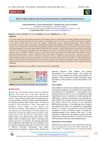 November 2022 in “International journal of pharmaceutical sciences review and research”
November 2022 in “International journal of pharmaceutical sciences review and research” Adding value and variety to herbal products helps promote them and can make India a leading exporter.
 March 2024 in “World Journal Of Advanced Research and Reviews”
March 2024 in “World Journal Of Advanced Research and Reviews” Herbal hair oil helps improve hair health and prevent hair problems.
 October 2023 in “Plant Archives/Plant archives”
October 2023 in “Plant Archives/Plant archives” Hibiscus rosa-sinensis is effective and safe for use in herbal soaps and hair oils, promoting skin and hair health.
 67 citations,
February 2015 in “Life Sciences”
67 citations,
February 2015 in “Life Sciences” Some plant-based treatments can help with benign prostatic hyperplasia symptoms, but more research is needed to confirm their safety and effectiveness.
 24 citations,
January 2015 in “Annals of Dermatology”
24 citations,
January 2015 in “Annals of Dermatology” Herbal extracts may help hair grow and could be an alternative to synthetic hair loss treatments.
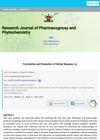 November 2024 in “Research Journal of Pharmacognosy and Phytochemistry”
November 2024 in “Research Journal of Pharmacognosy and Phytochemistry” Herbal shampoo with beetroot and sunflower is safer and better for hair and scalp than synthetic shampoos.
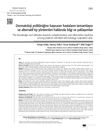 December 2015 in “Turkderm”
December 2015 in “Turkderm” About 30% of dermatology patients used complementary and alternative medicine, mostly women with higher education and income, but 85% still preferred traditional medical treatments.
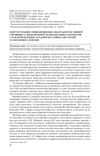 January 2015 in “Farmatsevtychnyĭ zhurnal”
January 2015 in “Farmatsevtychnyĭ zhurnal” The tincture made from nettle, sage, and horse chestnut in a 5:3:2 ratio is effective for treating telogen effluvium.
 581 citations,
February 1998 in “The American Journal of Medicine”
581 citations,
February 1998 in “The American Journal of Medicine” Herbal remedies can cause adverse effects and need more safety research.
 June 2024 in “International Journal of Advanced Research in Science Communication and Technology”
June 2024 in “International Journal of Advanced Research in Science Communication and Technology” Herbal extracts like Ficus religiosa may help with hair growth and skin rejuvenation.
 10 citations,
January 1996 in “Journal of Dermatological Treatment”
10 citations,
January 1996 in “Journal of Dermatological Treatment” Herbal preparation effectively promotes hair growth and reduces hair loss.
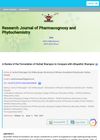 November 2024 in “Research Journal of Pharmacognosy and Phytochemistry”
November 2024 in “Research Journal of Pharmacognosy and Phytochemistry” Herbal shampoos are safer and effective for hair care compared to chemical shampoos.
 1 citations,
December 2013 in “Turkderm”
1 citations,
December 2013 in “Turkderm” Use of cosmeceuticals during pregnancy and breastfeeding is not recommended due to insufficient safety data.
 39 citations,
June 2013 in “Journal of Cosmetic Dermatology”
39 citations,
June 2013 in “Journal of Cosmetic Dermatology” Herbal extracts and platelet-rich plasma together may help increase hair growth by making certain cells grow more, through specific cell growth pathways.
June 2024 in “Deleted Journal” Herbal plants may help treat hair loss with fewer side effects than synthetic drugs.
 18 citations,
September 2018 in “Current Pharmaceutical Design”
18 citations,
September 2018 in “Current Pharmaceutical Design” Some medicinal plants may treat hair loss with fewer side effects.
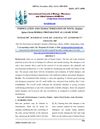 November 2022 in “International journal of biology, pharmacy and allied sciences”
November 2022 in “International journal of biology, pharmacy and allied sciences” The new herbal shampoo is effective, safe, and more affordable than other products.
28 citations,
March 2007 in “E-Journal of Chemistry” Herbal formulations with certain herbs can boost hair growth as effectively as minoxidil.
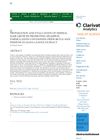 3 citations,
October 2018 in “International Journal of Green Pharmacy”
3 citations,
October 2018 in “International Journal of Green Pharmacy” The herbal shampoo with Piper betle and Psidium guajava leaves extract promotes hair growth and improves hair health.
 25 citations,
May 2012 in “Journal of The European Academy of Dermatology and Venereology”
25 citations,
May 2012 in “Journal of The European Academy of Dermatology and Venereology” Many Korean patients with hair loss, skin allergies, and psoriasis use alternative medicine, but satisfaction is low.
 1 citations,
November 2019 in “International Journal of Research in Pharmaceutical Sciences”
1 citations,
November 2019 in “International Journal of Research in Pharmaceutical Sciences” Ginger-containing herbal gel may help hair grow.
 October 2008 in “한국생물공학회 학술대회”
October 2008 in “한국생물공학회 학술대회” Four herbal extracts in a liposomal formulation can help prevent hair loss.
 February 2025 in “International Journal of Advanced Research in Science Communication and Technology”
February 2025 in “International Journal of Advanced Research in Science Communication and Technology” Fenugreek seeds may improve hair health and growth.
 1 citations,
June 2022 in “International Journal of Health Sciences (IJHS) (En línea)”
1 citations,
June 2022 in “International Journal of Health Sciences (IJHS) (En línea)” Herbal hair oils help with hair problems and are safer than synthetic products.
 6 citations,
January 2016 in “Evidence-based Complementary and Alternative Medicine”
6 citations,
January 2016 in “Evidence-based Complementary and Alternative Medicine” Boiling and fermenting certain herbs can help hair grow by activating hair growth genes and pathways.
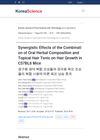 1 citations,
April 2012 in “Korean Journal of Food Science and Technology”
1 citations,
April 2012 in “Korean Journal of Food Science and Technology” Using both oral herbal supplements and hair tonic together works better for hair growth than using just the tonic.

Combining oral and topical treatments improves hair growth more than using either alone.
 2 citations,
July 2009 in “Pharmacognosy Research”
2 citations,
July 2009 in “Pharmacognosy Research” A herbal mix with chickpea, holy basil, and nut grass extracts grew rat hair well, similar to a common hair growth drug.
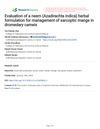 1 citations,
January 2023 in “Research Square (Research Square)”
1 citations,
January 2023 in “Research Square (Research Square)” A neem-based herbal treatment worked better than ivermectin for sarcoptic mange in camels, improving their recovery and overall health.




























